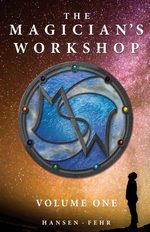 The Magician’s Workshop, Volume One
The Magician’s Workshop, Volume One
by Christopher Hansen, J.R. Fehr
Series: The Magician’s Workshop, #1
Kindle Edition, 290 pg.
Wondertale Press, 2014
Read: Mach 22 – 24, 2017

I’m sick and tired of these books that introduce you to a character and their problems/goals and then abandon them for another storyline or two with no relation to the first for over 50% of the book. I get that this is a thing that people do all over the place (I read a couple of books last year that never returned to the people in the introductory chapter or really explained why we spent time with them), but it drives me crazy. Fine, multiple point-of-view characters, multiple storylines, but don’t dump one for 150 pages or so after introducing them.
That’s probably not the best way to start this post, but hey, if they can start the book awkwardly, I can start my post about it awkwardly, too.
There was some great worldbuilding at work here — Hansen and Fehr did yeoman’s work there. But they failed at translating it into a setting for stories. They wisely didn’t dump everything on the reader in the first chapter — but they way they went about doling out the explanation of what’s going on, why the world/magic/society works the way it does was way too slow. I can’t imagine that all too many readers in their target audience (12 and up) are going to have the patience to wade through it all.
Part of the magic system is another one of my pet peeves — everyone has magical powers. This can work, but usually it doesn’t — as even Dash Parr can tell you, everyone being special (or having magic) “is another way of saying no one is.” I’m not sure why that’s considered magic in this world. For underage people, they can only use their magic for training in controlled circumstances. When they get older, they’re tested and part of the test (that makes no sense to me) will reveal whether the user is qualified to be a magician — one of the elite professional magicians, as opposed to those who are limited in their use of magic — by some standard I can’t explain.
The novel focuses on a handful of youth — some who know each other, some that don’t — as they finish preparation of the day of testing. Some have lofty goals, some have small, but important goals, some have dark backstories, others are trying to be the first in their family to join the elite ranks.
Here’s my biggest beef with this book: there’s no story here. It’s all set-up. It’s The Fellowship of the Ring that stops when they get to Rivendell and the Council starts, or any Spider-Man story that stops after the death of Uncle Ben these characters get to (and in some cases, start) the testing and the book ends. Yeah, sure, the notes at the front of the book say this is to be read with Vol. 2 — but, sorry, that doesn’t cut it. There’s not a story here, there are no complete arcs — it’s part of a book.
There’s some not unclever commentary on media culture, critique, fans and whatnot throughout this book — especially later on. Also, there’s a strong “hey, the real world is just as fantastic as the ones we create” message that I really appreciated. Some good stuff for younger readers to read.
This is a swing and a miss — there’s a lot to be commended here, but the flaws are too much to overlook. I want to give this a 3, but I just don’t think I can justify it.
Disclaimer: I received this book from the publisher in exchange for this post and my honest opinion. Sorry.
—–


